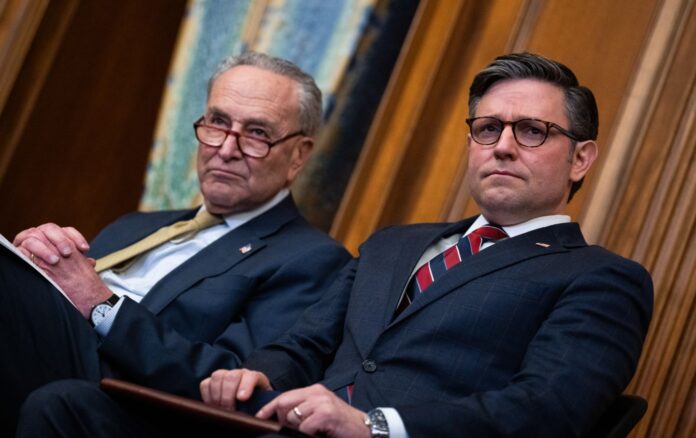Politics
/
November 22, 2024
The House passed a bill aimed at giving the government sweeping powers to crush nonprofits and attack supporters of Palestine. Democrats need to stand firmly in its way.
Chuck Schumer and Mike Johnson attend a Menorah lighting to celebrate the eight-day festival of Hanukkah, in the US Capitol on Tuesday, December 12, 2023.
(Tom Williams / CQ-Roll Call, Inc via Getty Images)
While President-elect Donald Trump doesn’t return to office until January 20, Congress is already advancing the most sweeping and dangerous terrorism legislation in a generation, which would give him the power to shut down legitimate civil society groups doing important charitable, community organizing, human rights, and humanitarian work.
Earlier this week, the House passed HR 9495, an amendment to the tax code that would empower the Treasury Department to unilaterally brand nonprofit groups as “terrorist supporting organizations” and suspend their charitable tax exemption, without giving the groups any due process or access to the evidence against them. The resulting stigma of such a designation would almost certainly be enough to scare off banks, likely depriving these groups of the ability to function altogether.
The drive to kill nonprofits is dangerous no matter who is president, and, in the past few weeks, most House Democrats appear to have woken up to the risks of the legislation. Fifty-two Democrats voted to support the bill as recently as last week, but by the time a subsequent vote came around on Thursday, only 15 voted in favor. But that was still enough to give Republicans the votes they needed to pass it. Going forward, the demand from everyone watching this process should be clear: Even one Democratic vote is one too many, and Senate Democrats should promise that they will not support the legislation.
It’s not hard to see the reason behind this sudden attack on nonprofits. The bill’s sponsors have made no secret of their desire to smear certain nonprofits connected with campus protests against Israel’s war on Gaza as working at the behest of Hamas—a claim for which there is no evidence. Israel’s supporters in Congress and elsewhere have been equally clear about their agenda to crush Palestine human rights advocacy in the United States. Just last month, the Heritage Foundation unveiled “Project Esther,” a policy blueprint to attack supporters of Palestinian rights in the higher-education and profit sectors—essentially an anti-Palestinian Project 2025.
But the dangers extend far beyond any one issue. Two Republican House committee chairs earlier this year sent a letter to Treasury Secretary Janet Yellen demanding information on 20 groups, from Students for Justice in Palestine (which isn’t even a registered nonprofit) to liberal behemoths like the Open Society Foundations and the Bill and Melinda Gates Foundation.
Such persecutions would compound an already draconian legal landscape for nonprofits and political organizations. As civil liberties advocates have pointed out, providing “material support” to groups on the foreign terrorist organizations (FTO) list has been a federal crime since the 1990s. The material support statute extends far beyond blocking funds to punish many forms of speech and advocacy ordinarily protected by the First Amendment. And under the broad authority of sanctions laws, the government has also asserted the authority to freeze the assets of US-based organizations without due process, shutting down multiple American Muslim charities after 9/11 as part of a broader crackdown that targeted Palestinians in the Chicago area in particular.
Current Issue

The danger of the new proposal lies in disguising sweeping powers to shut down civil society groups as incremental change. Federal agencies maintain many lists of alleged terrorist organizations through designation processes that have long been criticized as opaque, unreviewable, and discriminatory against Muslims.
Thus, despite the massive post-9/11 expansion of the government’s surveillance and policing powers, many of the laws targeting foreign terrorist groups have never had a domestic counterpart. The material support statute is the exception that proves the rule: It allows punishment of US citizens, but only for supporting groups on the FTO list. The main legal reason for this has been the First Amendment’s protection of the freedom of association. The main political reason has been pushback from right-wing politicians sympathetic to white nationalist groups, as well as from progressive civil libertarians.
… (content truncated for brevity)
We cannot back down
… (content truncated for brevity)




